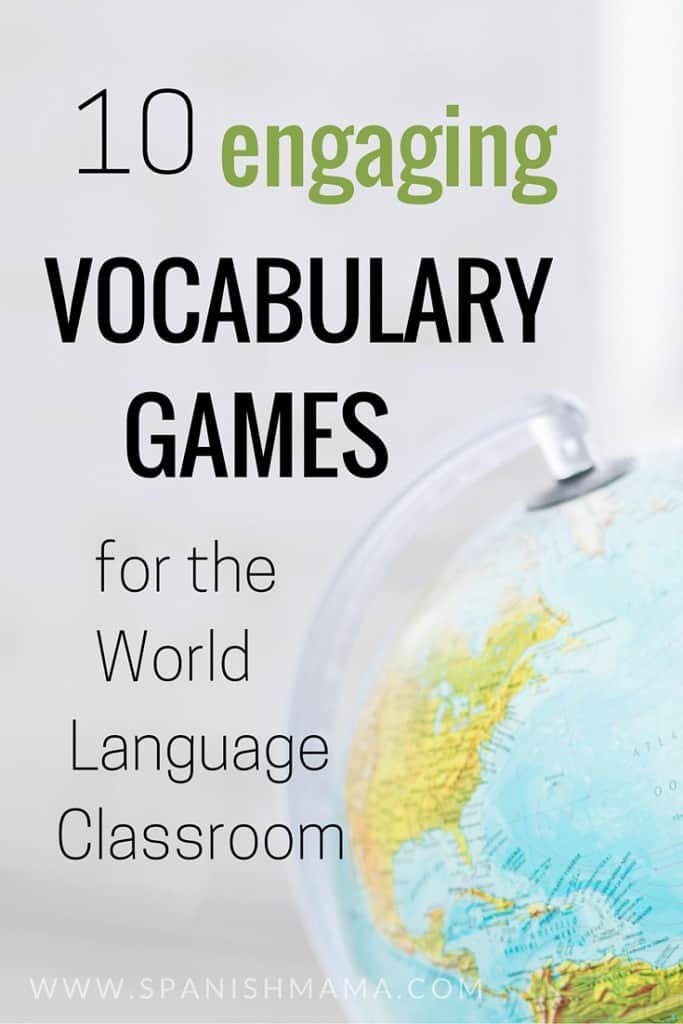10 Spanish Vocabulary Games for the Language Classroom
Inside: Spanish vocabulary games for the language classroom.
The best way to “learn vocabulary” is in context. I use to give long lists of isolated words, until I switched to proficiency-based teaching and threw out my textbook. I realized my students were memorizing the words to pass a quiz, and then forgetting them. Our students really need to see whole language, in context, in stories, songs or texts.
Or GAMES!
They are great for brain breaks, team building, getting everyone moving, and motivating our students. Just make sure that these vocabulary games for Spanish class are supplementing LOTS of Spanish in context. Whenever possible, give the language for these games in chunks, rather than just isolated words.
If you’re looking for more ideas, check out my Spanish learning games page, or try these:
- 10 Interactive End-of-the-Year Games
- 10 Icebreakers and Beginning-of-the-Year Gasmes
- Fun & Easy Games for Preschool and Early Elementary
10 SPANISH VOCABULARY GAMES
1. FOUR CORNERS
“It” counts to ten while everyone else quietly chooses a corner of the room to stand in. “It” calls out a corner (without looking), and everyone in that space is out. Last student in, wins.
To review vocabulary, tape a sketch of four vocabulary words onto each corner of the room. (Write the terms in Spanish on the board.) Student who is it counts to 10, then calls out one of the terms on the board. Everyone in the matching corner is out.
To take this up a notch, make each corner a category (food, things to do, etc.). Write a bunch of terms on the board. “It” calls out a word from the board, and the corresponding corner is out.
2. CHARADES / PICTIONARY
Play charades and pictionary combined, to give the students more choice. For each term, whoever is up front has the option to act it out or draw it on the board. You can also get everyone more involved by playing reverse charades, by giving the class whiteboards. The student who is “it” guesses while his/her entire team mimes or draws the term.
3. CELEBRITIES
Write the phrases on slip of paper. Students sit in a circle. Divide the class into 2 or more teams by counting 1-2. For each team’s turn, set a time (1-2 minutes).
1st round (actions): Team 1 begins as a player draws a slip. That student acts out the phrase. When the team guesses correctly, the next player on Team 1 draws another slip and the play continues until the time is up. The timer is set again for the other team, and turns continue until all the slips are gone. Count the slips and give those points to their teams.
2nd round (verbal clues): This round is the same as the first, except that the students must use clues in Spanish. If the slip says va a la casa, for example, the students could say cuatro palabras, es como camina, corre o advanca, donde vivo, etc. This will be very difficult for beginners, so you may want to let students make word webs for the phrases before playing, to brainstorm and think of related words and synonyms. This is great practice for circumlocution.
3rd round (one-word clues): This round is the same as the second, except that the students must only use one word. If the phrase is va a la casa, the student could say vivo, and the team has to guess the phrase from this one clue.
*In the original game, the actions are for the third round and that’s supposed to be the hardest round. For students learning another language, that is probably the easiest, so I made it first.
4. BINGO
Bingo is great because it is flexible. You can give the students blank games, and have them illustrate the terms. Then, call out the terms in the target language and no English gets used. I have an entire post on Getting More Mileage Out of Bingo!
5. EL MARCADOR
This can be used for ANYTHING– new words, old words, reviewing stories, themes, or movies. Call out sentences using the vocabulary you want to review.
6. SLAP-IT/ FLYSWATTER
Divide the class into groups of 4-5. Pass out only picture cards to each group. Lay the picture cards face up, in the middle of the group. Call out the terms. The first student to touch the corresponding image keeps the card. Whoever has the most cards at the end wins.
Flyswatter is similar, except that two students come up to the front and hit pictures projected onto the board with (clean) flyswatters. My La casa Slideshare would work with this.
7. RED LIGHT, GREEN LIGHT
Line up the students on one side of the space. Whoever is “it” calls out a specific action to perform, like dance. Everyone advances, dancing. When Red light! (in the TL) is called, everyone freezes and anyone who moves is sent back. Often I will stand at the front and yell out what action to do (so I can control what they’re practicing) and the student who is “it” just concentrates on saying red light and catching unlucky moving friends.
8. NO-PREP MEMORY
Make game cards to play Memory in groups. Pass out paper squares to the groups, and each student in the group comes up with several questions and answers, OR words and pictures. Have the students check their cards with you when ready. Set a minimum, but let early finishers do extra cards. Then let them play in groups! The activity should be self-monitoring since the students themselves made the cards.
9. AROUND THE WORLD / SPARKLE
This can be played in a circle or with everyone in their seats. Choose one student. He/she stands up next to the student to the right. Call out a word. The first student to give the meaning advances, and the other stays in that seat. The first students to advance all the way around the room and return to his/her original seat wins.
10. STORYTELLING
Here are some explanations of storytelling and games to go with stories:
Storytelling in the World Language Classroom – TPRS
Strip Bingo – Listening game during input
After storytelling, play Draw/Write/Pass to review the story:
Like it? Pin it!








nice post!
If you are looking to learn different language program, you can visit our website http://www.middleeastplus.com we provide different language courses in the academy as well as online.
Selam!
I am writing from Qaragandy, Kazakhstan, that is Central Asia. I am an English teacher and today i came across with your site. I adore it
I would like to say keep working. May God gift you eith health.
Love all these game ideas. I will try them with the students. Thank you!
These are wonderful ideas. Thank you.